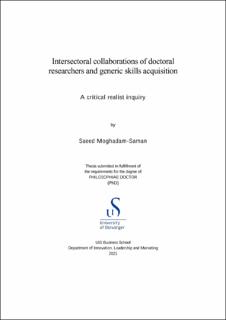| dc.description.abstract | This dissertation aims to enrich the academic knowledge that can support policies around integration of doctoral graduates as a prominent group of knowledge workers, into industry and other non-academic career sectors in Europe. Positioned within the broader field of innovation systems, the dissertation contributes to the literature stream of university-industry relationships with a specific focus on the collaborative relations between doctoral researchers and industry. Given the observation that the number of doctoral graduates in Europe is continuously increasing while the opportunities for pursuing an academic career do not show a comparable trend, the importance of preparing doctoral candidates for a more diverse career prospect is evident. Furthermore, the drive for transitioning to a knowledge-based and innovative economy has meant for many European countries that knowledge sources in general, and universities in particular, have gained a more prominent position vis-à-vis the other sectors in their economy. Accordingly, there is an increasing space opening up across advanced economies for the employment of doctoral graduates in industry and public governance positions in order to absorb their knowledge and skills into those organizations. While this has provided doctoral graduates further potential for post-PhD employment, there has been concerns expressed by those non-academic employers regarding the mismatch between the skills sought by them and the skills acquired by PhD candidates during their doctoral training.
The four papers included in this dissertation form together a stepwise inquiry into the rationale, quiddity, prevalence and immediate effects of collaborative doctoral programmes as a mechanism for addressing the above-mentioned concerns about doctoral education. As the overall underlying research paradigm, critical realism provides the framework for establishing a coherent inferential logic across the papers, in addition to supplying the meta-theory for comprehending the subject matter of the inquiry and interpreting the findings. The introductory chapter of the dissertation is partly dedicated to explicating the argument for choosing such a critical realist approach, which mainly stems from academic disciplines being conceived as harboring a generative mechanism that hypothetically exert the most significant influence on doctoral researchers’ opportunities for engaging in intersectoral collaboration. In fact, the theoretical core of the last three papers in the dissertation is constituted of alternative hypotheses on the significance of academic knowledge fields (disciplines) in shaping the collaboration opportunities and behavior of doctoral researchers, and whether such a significance is consistent across all the disciplinary groups. Accordingly, the last two papers empirically investigate to what extent the disciplinary factor functions consistently across different higher education contexts in a deterministic manner, and how the learning experience of doctoral researchers from participating in collaborative schemes is formed by disciplinary and context-driven factors.
Findings of this dissertation can be summarized as follows; i) there exists skepticism among industrial employers regarding the preferability of doctoral graduates over, for instance, postgraduates with master’s degree, as the skills set of the former are deemed too focused, and their attitude is perceived as less flexible. Furthermore, among doctoral graduates, those who have experienced collaborative doctorate programmes such as Industrial PhD are often preferred by industry; ii) the systemic attributes of the intrasectoral and intersectoral relations in which university-industry collaborations materialize has influence on the type and efficiency of those collaborations around doctoral training. The higher level of consensus among the system actors facilitates practicebased acquisition of transferable skills for doctoral students; iii) the extent to which affiliation with a specific academic disciplinary area affects the opportunities of doctoral researchers for intersectoral collaboration can be different depending on the discipline. In the case of the four universities studied in the Scandinavian context, hard-applied and soft-pure disciplines appeared more susceptible to the influence of contextual (local) factors on the disciplinary factor and its mechanism, while hard-pure and soft-applied disciplines seem to exert comparable influence on the intersectoral collaboration opportunities across different country contexts; therefore, iv) higher education policies targeting the improvement of intersectoral collaborations during doctoral education need to take into account the heterogeneity of academic disciplines in terms of their receptivity of different policy tools. While for some disciplines, introducing interdisciplinarity can be the main option, for others, improving the organizational and institutional aspects of the collaborations would help more. I have referred to this heterogeneity as discrepancy between the discipline-based regimes of intersectoral collaboration; v) when it comes to the learning of generic (transferable) skills through collaborative schemes during doctoral education, their codevelopment with the disciplinary knowledge seems to be a key condition. The cognitive interrelation between some of the generic skills and the discipline-specific skills proves to be so strong that make parallel and balanced development of generic and disciplinary skills more important than other factors such as the duration of collaboration or its funding composition. In other words, the commitment of the nonacademic side of the collaboration shows its influence more through dedication of resources such as industrial supervisor who can facilitate coordination of data and knowledge exchange between the two collaboration sides and harmonize the acquisition of generic and discipline-specific skills by doctoral candidates.
Further to the above-mentioned findings, this dissertation puts forward an analytical conceptual framework adapted from critical realism, based on which the evaluation of (collaborative) doctoral programmes is done by distinguishing between contextual and disciplinary mechanisms as well as their outcome in terms of learning. The emphasis on the contextuality of explanations, and that such explanation is just better than the rival ones, are aspects which make such a framework suitable for implementation in other studies for further investigations of the matter. Finally, a key message from this dissertation is that for enriching doctoral education with providing doctoral candidates a comprehensive set of generic skills, there is a need for more intensive involvement of industry in the design of collaborative schemes, and the organizing for this needs to be done at the level of academic departments or faculties rather than graduate schools at the university level. | en_US |

